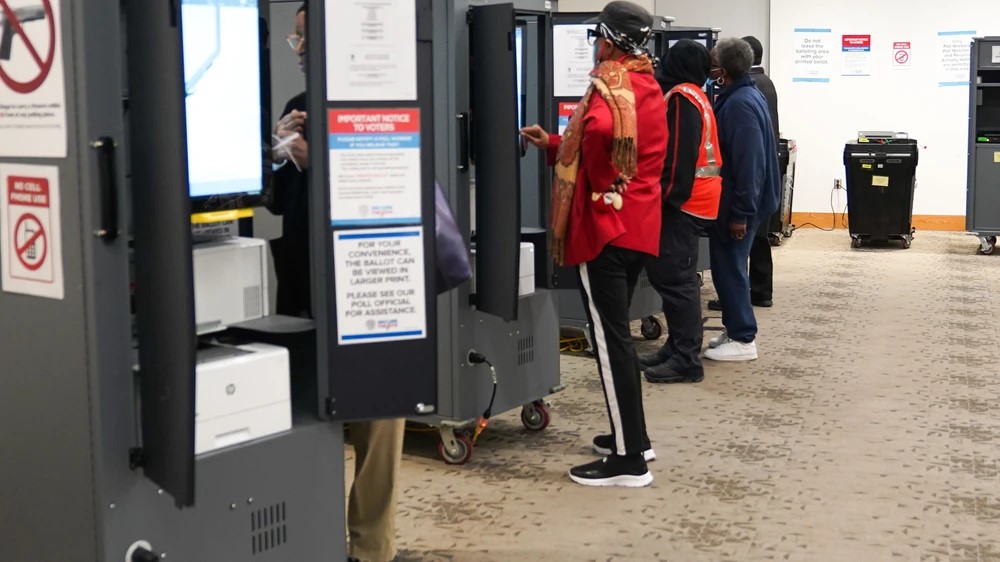As the 2024 election season kicks off in full force, Georgia has already made headlines with a record-breaking early voting turnout, positioning itself once again as one of the most crucial battleground states in the U.S. political landscape. More than 328,000 ballots were cast on the first day of early voting alone, a significant leap from the previous first-day record of 136,000 in 2020, signaling a heightened level of engagement from voters across the state. Gabe Sterling, Chief Operating Officer for the Georgia Secretary of State’s office, announced the impressive turnout on X (formerly Twitter), reflecting on the state’s pivotal role in shaping the national political dialogue.
Georgia’s heightened significance stems largely from its razor-thin margins in the 2020 election when President Joe Biden won the state by just over 11,000 votes, a victory that was fiercely contested by then-President Donald Trump and his allies. Their efforts to overturn the results not only intensified the political climate in the state but also brought about significant changes in how elections are conducted. In 2024, Trump is once again seeking Georgia’s electoral votes as part of his broader campaign to reclaim the presidency, while Biden aims to maintain his hold on the state in what is shaping up to be another close contest.
The surge in early voting comes amid an ongoing wave of lawsuits and legal challenges to Georgia’s revamped election laws, which were introduced by Republican members of the State Election Board following the 2020 election. These changes have sparked widespread controversy, with critics, including Democrats and civil rights organizations, accusing the reforms of restricting access to the ballot, particularly for minority and low-income voters. Many of the lawsuits challenging these laws remain unresolved, adding an additional layer of uncertainty as Election Day draws nearer.
Among the most contentious issues is the tightening of absentee voting rules and the reduction in the availability of drop boxes, which were widely used during the 2020 election due to the COVID-19 pandemic. In 2020, drop boxes were available at multiple locations across the state and could be accessed 24 hours a day. However, under the new laws, the number of drop boxes has been significantly reduced, and they are only available during specific hours, typically coinciding with regular business hours. Critics argue that these changes disproportionately affect voters who cannot take time off work or travel to polling locations, potentially suppressing turnout among historically marginalized communities.
Despite these concerns, Georgia Secretary of State Brad Raffensperger reassured voters that election security measures are in place to ensure a smooth and transparent process. Raffensperger, who rose to national prominence during the 2020 election when he resisted pressure from Trump to overturn the results, emphasized that additional safeguards, including audits and random inspections of voting equipment, will be in place to prevent tampering or fraud. “We’re conducting random audits of machines on Election Day, pulling equipment from polling places to verify that they are accurately recording votes,” Raffensperger explained. His commitment to transparency and election integrity has been a hallmark of his tenure, particularly in the face of ongoing political pressure.
For many voters, the improvements in the voting process compared to previous years have been a welcome relief. Corine Canada, an Atlanta resident who participated in early voting, shared her experience with local media, describing how the process has become more streamlined. “In the last election, the lines were so long that people started leaving before they could vote,” she recalled. “But this time, it was much better organized. I was in and out in less than 30 minutes.”
While Georgia’s early voting numbers are setting records, the state is also dealing with the aftermath of Hurricane Helene, which swept through the southeastern United States last month, leaving significant damage in its wake. Despite the challenges posed by the hurricane, Raffensperger confirmed that absentee ballots were sent out on schedule, and the storm has not disrupted the state’s election preparations. “We’re seeing absentee ballot requests increase, and we expect to reach around 300,000 requests before Election Day,” Raffensperger noted.
Georgia’s legal battles over election reforms are far from over, with many of the state’s new rules being challenged in court. On Tuesday, Fulton County Superior Court Judge Robert McBurney temporarily blocked a rule that would have required officials to hand-count ballots at polling places, criticizing the state for implementing the rule so close to the election. The hand-counting rule is one of several regulations being scrutinized in a series of lawsuits filed by Democrats and civil rights groups, who argue that the changes could lead to post-election chaos and delays in certifying results.
Another controversial rule under legal scrutiny is the requirement for local election officials to conduct a “reasonable inquiry” into election results before certifying them. Opponents argue that this provision could give county officials too much discretion, potentially allowing them to delay certification or refuse to certify results if they suspect irregularities. However, McBurney recently ruled that local officials have a “mandatory obligation” to certify election results within a specified timeframe, rejecting arguments that the certification process could be delayed indefinitely.
As legal battles continue to unfold, Georgia voters are keenly aware of the high stakes in this year’s election. Many view their participation as not just a civic duty but a crucial step in shaping the future of the state and the country. At a polling station in the Atlanta area, voters expressed a range of motivations for casting their ballots early. Fay Ainsworth, a self-described Democrat, said she voted to prevent the return of the “chaos” she associates with Trump’s presidency. “We have to vote to stop the division and chaos he brings to this country,” Ainsworth said. Her fellow voter, Joseph Henry King Jr., 77, echoed her concerns, emphasizing his support for Vice President Kamala Harris. “Trump is unfit to lead, and Harris represents competence and integrity,” King remarked.
For independent voters like Kareem Rosshandler, 32, this election presents an opportunity to send a message to both major political parties. Rosshandler, who voted for Green Party candidate Jill Stein, said he was protesting U.S. foreign policy, particularly the Democratic Party’s stance on the Israel-Hamas conflict. “We’ve been protesting for an arms embargo, but they haven’t listened. Voting is how we make our voices heard,” Rosshandler said, adding that he supports the Green Party’s call to abolish the Electoral College. “The two-party system isn’t working, and it’s time for a change.”
As Georgia’s election season progresses, the state remains a critical focal point in the national political arena. With record-breaking early voting turnout, ongoing legal challenges, and high voter engagement, the results in Georgia could have far-reaching implications for the 2024 presidential race and the future of U.S. elections.






